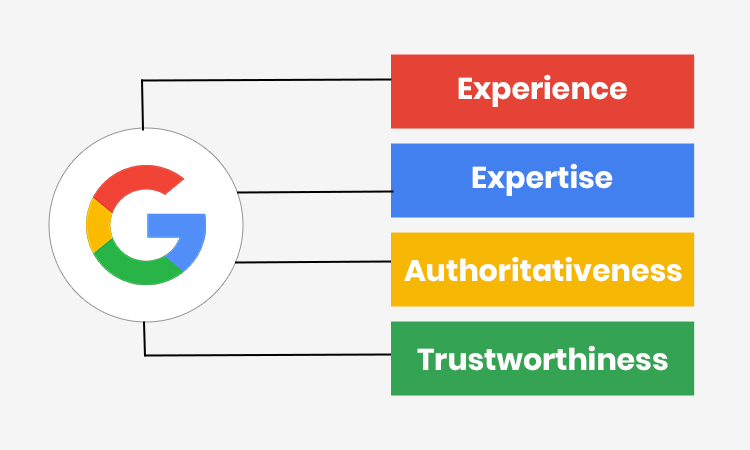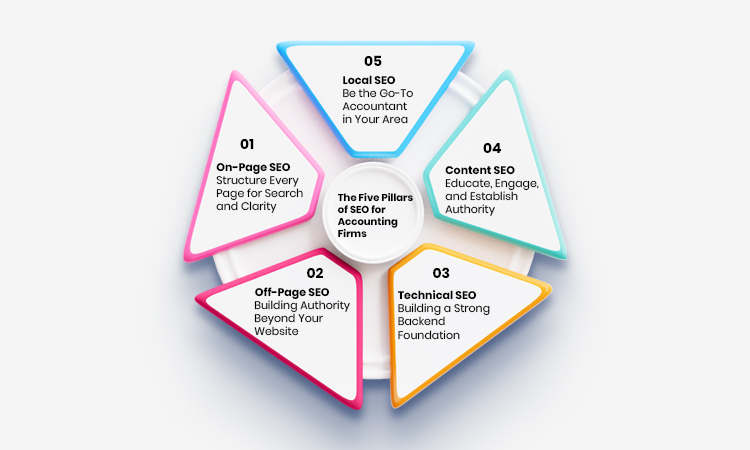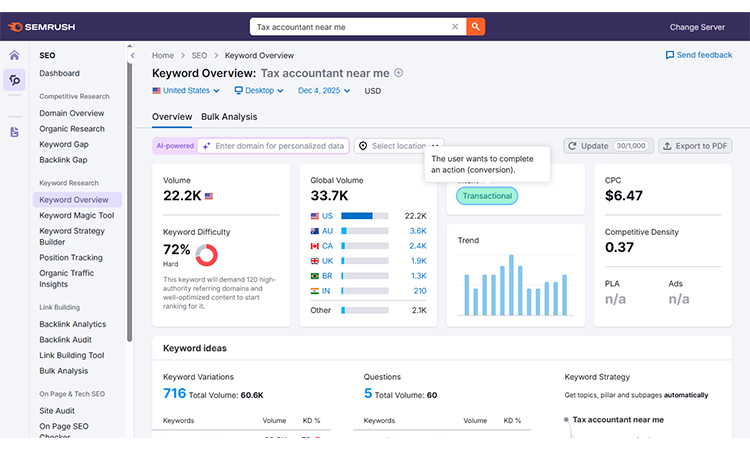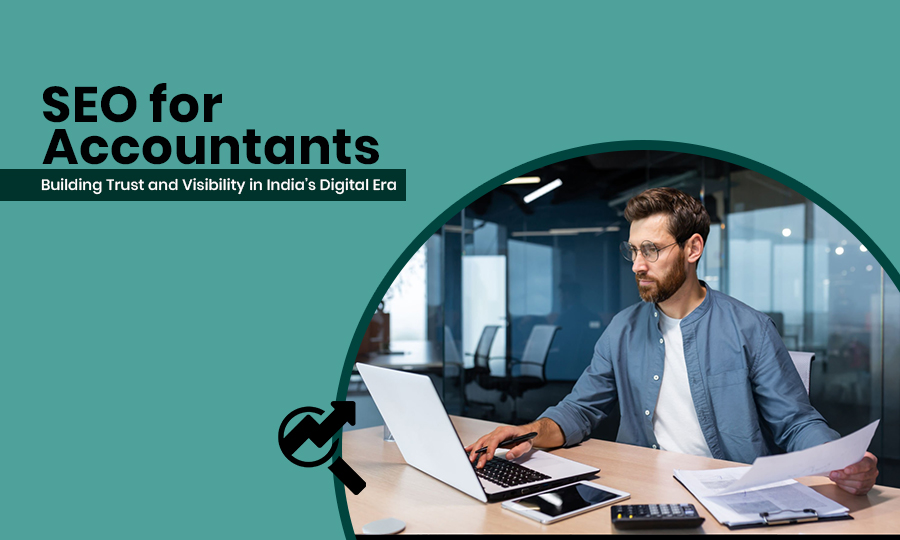Since 2014, India has rapidly digitised its economy, which has changed everything. The way we pay, study, or even buy or search for services. Gone are the days when a business relied on traditional or word-of-mouth to get more leads or increase sales. Today, clients search on the internet and rely more on digital visibility when choosing service providers, and accountants are no exception. According to HubSpot’s 2024 data, 68% of online experiences begin with a search engine, and a client is 70% more likely to contact a firm appearing on the first page of Google.
If you are an account professional, this means that your online presence is not just a marketing tool. It is also a reflection of your credibility, expertise, and trustworthiness. For this reason, SEO (Search Engine Optimization) is no longer optional. It is a strategic necessity for building authority and getting quality leads to help you maintain long-term client relationships.
This guide will break down exactly what accountant-focused SEO entails, why it matters, and how to implement actionable strategies to grow your practice online.
What SEO for Accountants Really Means
Search Engine Optimisation (SEO) for accountants is the structured process of improving the online visibility of an accounting firm and highlighting its services. This ensures that potential clients can find you easily. Unlike generic SEO, accounting SEO is niche-specific because it emphasizes trust, accuracy, and thought leadership, rather than flashy marketing gimmicks.
A strong accountant SEO strategy typically revolves around four core components-
- On-Page SEO – This refers to restructuring your official website for more visibility. This is achieved by optimising service pages, meta tags, and site structure to clearly communicate your services and expertise.
- Off-Page SEO – This is all about publishing content on niche-specific websites to improve the authority of your on-page content. This is done by building credible backlinks, online mentions, and achieving citations from authoritative financial sources.
- Technical SEO – In this technical parameters of a website are adjusted as per the best practices suggested by Google to improve website performance, speed, mobile responsiveness, and security to meet both user expectations and Google standards.
- Local SEO – Most of the searches come from local clients. Local SEO helps in targeting clients in your city or region through Google Business Profile optimization, location-based keywords, and local reviews.
The goal of this process is simple. To build a robust online presence so that when a potential client searches for “best CA in Mumbai” or “GST filing for startups,” your firm should be among the top results, reflecting both reliability and authority.
Why SEO Matters for Accountants
As already stated above, online presence is not just about improving visibility but also building trust in your accounting services. Today, Indian clients are increasingly conducting thorough online research before engaging with accountants to avail their services. For this reason, relying solely on referrals or traditional networking is no longer sustainable for any accountant. SEO offers a scalable and cost-effective system to continuously attract leads without ongoing ad spend.
Unlike temporary marketing campaigns via newspaper ads, pamphlets, or cold calling, a well-optimised website becomes a long-term digital asset. In SEO, good quality and relevant content is published consistently, which helps in maintaining a professional online presence and building trust through client reviews. All these positions portray your account firm as knowledgeable, reliable, and accessible. A combination that drives higher conversion rates and sustained growth.
Understanding the Modern Client Journey
Understanding the journey of a client is the backbone of a reliable SEO strategy. A client’s decision-making process typically follows three stages-
| Stage | Search Intent | Example Queries | SEO Application |
| Awareness | Informational | “Tax saving for salaried employees,” “How to register GST” | Blogs, guides, explainer content addressing general accounting questions |
| Research | Comparative | “Best tax consultant near me,” “Top auditing firms in Delhi” | Service pages, FAQs, client testimonials, comparison posts |
| Action | Transactional | “Book a CA consultation online,” “Schedule GST filing appointment” | Contact pages, booking forms, clear CTAs |
SEO supports each stage by positioning your firm where clients are actively seeking answers. Educational blogs and detailed service pages help build confidence long before the first consultation, making clients more likely to trust and engage with your firm.
Important Elements of Accounting SEO to Form A Formidable Strategy
Accounting SEO is a broader term to define the overall process, but there are fine elements that turn it into a meaningful strategy. These elements work as a machine with different parts synced to move in tandem to bring visible results. They are E-E-A-T, Technical, On and Off-Page SEO, Content, and Local SEO, etc. Let’s explore more about them in detail and know how they work individually to bring you success.
- How Google Measures Trust – E-E-A-T for Accountants

Visibility is a proxy for credibility. Clients tend to trust accounting firms that appear consistently in search results in the top position, and Google evaluates this using its E-E-A-T framework (Experience, Expertise, Authoritativeness, and Trustworthiness).
For accountants, trust signals include-
- Experience-based Content – Publishing relevant blogs and guides that reflect real-world accounting expertise.
- Backlinks from Authority Sites – Mention of your website and service-related keywords on financial websites, news portals, or startup platforms.
- Client Reviews – Real testimonials and ratings from happy clients show reliability and satisfaction.
The combination of these elements enhances both Google rankings and client confidence. This, in turn, helps in establishing your firm as a reputable choice in the competitive financial services market.
- The Five Pillars of SEO for Accounting Firms

Your strategy should cover five key pillars to succeed in accountant SEO. They all work together to increase your online visibility, credibility, and client engagement. Each pillar has its own importance in shaping your digital footprint, from how Google indexes your website to how potential clients perceive your expertise.
1. On-Page SEO – Structure Every Page for Search and Clarity
On-page SEO is the base of your visibility. It ensures search engines understand what your website is about and visitors find relevant and trustworthy information when they land.
Actions-
- Optimise meta titles and descriptions –
Each page should have keyword-rich meta titles that reflect your services and location. For example, “Chartered Accountant in Delhi | Tax Filing & Audit Services.” Meta descriptions should summarise your offerings and have a clear CTA (“Book your consultation today”). - Define your services clearly –
Each service should have its own dedicated page, for example-- Tax Filing and Compliance
- Auditing and Assurance
- Corporate Returns and Financial Statements
- Startup Accounting and Advisory
This will improve rankings for niche keywords and the user journey by providing clarity.
- Use proper heading hierarchy (H1, H2, H3) –
A logically structured content helps Google understand its relevance. Use your main keyword in the H1, related keywords in H2s, and subtopics in H3s. - Internal linking –
Link related pages, like from a “Tax Filing” service page to a “GST Advisory” page, to help both users and search engines navigate your site easily. Internal links distribute authority across your website and boost page visibility. - Optimize for featured snippets and FAQs –
Include short and direct answers to common questions like “How long does it take to file GST?”, often asked by clients, to increase your chances of appearing in Google’s featured snippets.
Keep your tone professional but client-friendly and avoid jargon or complex words where possible. Also, focus on answering questions your clients actually search for.
2. Off-Page SEO – Building Authority Beyond Your Website
Off-page SEO focuses on improving your firm’s reputation and trustworthiness across the web. It is about how the digital world perceives your brand.
Key Actions-
- Earn high-quality backlinks –
Backlinks are like “votes of confidence” from other websites. When respected finance platforms, business blogs, or media portals link to your site, it signals authority to Google.- Contribute guest articles to financial blogs such as YourStory, Inc42, or CAclubIndia.
- Collaborate with startup platforms and business associations for content partnerships.
- Get listed in credible directories and citations –
Ensure your firm appears on trusted business directories like Google Business Profile, Justdial, IndiaMART, and niche financial directories are examples of the same. Consistency in NAP (Name, Address, Phone) details across these listings strengthens local SEO. - Engage in digital PR –
Feature your insights or expert opinions in media interviews, press releases, or industry newsletters. These build brand recognition and drive referral traffic. - Leverage social proof –
Encourage clients to share testimonials on platforms like Google, LinkedIn, and industry review sites. Genuine reviews significantly influence both rankings and credibility.
Focus on the quality, not the quantity of backlinks. One authoritative mention from a reputable finance site is worth more than dozens from low-quality blogs.
3. Technical SEO – Building a Strong Backend Foundation
Even the best content can fail if your site is technically weak. Technical SEO ensures your website is fast, secure, and easy for both users and search engines to navigate.
Key Actions-
- Website speed optimisation –
A slow site can scare away potential clients, so compress images, enable caching, and use a good hosting provider to keep your page load time under 3 seconds to keep users engaged. - Mobile responsiveness –
Over 70% of accounting-related searches in India happen on mobile, and this makes responsive design essential to make your site look and work well on any device. - Secure your site (HTTPS) –
SSL certification (HTTPS) is a non-negotiable trust factor for both users and Google’s algorithm. - Fix technical errors –
Regularly audit your site for broken links, 404 errors, or duplicate content. Tools like Google Search Console and Screaming Frog can help you maintain technical health. - Structured data and schema markup –
Add schema tags (e.g., “Accountant”, “LocalBusiness”, “FinancialService”) to help Google understand your business and enhance your search appearance with rich snippets. - XML sitemap and robots.txt –
These technical files guide search engines to crawl your site efficiently and prioritise important pages.
Think of technical SEO as the car engine because it is invisible to most users but essential for smooth performance.
4. Content SEO – Educate, Engage, and Establish Authority
For accounting professionals, content is where credibility and trust truly shine. Content SEO ensures that what you publish is valuable, optimized, and aligned with client intent.
Key Actions-
- Create client-focused, educational content –
Write blogs, guides, and FAQs that answer real questions, such as
- “How to choose the right tax regime under India’s new laws”
- “Bookkeeping tips for growing startups”
- “How GST audits work – a step-by-step guide”
- Use long-tail keywords –
Include specific, conversational keywords like “affordable CA for small business in Delhi” or “income tax consultant for freelancers.” These attract clients with high purchase intent. - Maintain consistency –
Publish fresh, updated content regularly, ideally 2–4 posts per month. This signals activity and relevance to Google. - Leverage multimedia-
Add infographics, short videos, and explainer visuals to make complex topics accessible. Visuals keep visitors engaged longer, reducing bounce rates. - Showcase expertise –
Use your experience to create content around case studies, tax law updates, and financial planning insights. This positions your firm as a thought leader in the industry.
Every blog or page should have a clear goal – to inform, solve a problem, or guide a potential client toward contacting you.
5. Local SEO- Be the Go-To Accountant in Your Area
Most clients prefer accountants located nearby. Local SEO ensures that your firm appears in relevant searches and Google Maps results.
Action Steps-
- Google Business Profile (GBP) – Fully optimise your profile with accurate NAP (Name, Address, Phone), business hours, website link, and services.
- Consistent NAP Across Platforms – Ensure all directories and social channels reflect identical information.
- Collect Location-Based Reviews – Encourage genuine client reviews to appear in local map packs.
- Local Schema Markup- Implement schema like “Accountant” or “Tax Advisor” to help Google understand your offerings.
When executed correctly, local SEO can position your firm as the trusted, nearby option for clients seeking financial services.
Remember, a visitor’s first impression of your site often determines if they will trust you with their money. Professional design and ease of use equal perceived reliability.
Each pillar supports the others like a balanced financial system. When on-page optimization meets strong off-page credibility, technical performance, authoritative content, and an excellent user experience, your accounting firm becomes both discoverable and dependable in the digital marketplace.
SEO for accountants is not a one-time checklist but a continuous process of earning visibility, building trust, and turning visitors into long-term clients.
- Keyword Research for Accounting Firms

Keyword research defines the scope and reach of your digital presence. Always remember proper choice of keywords is the key to a formidable SEO strategy that brings results. For accounting firms, combining high-intent and location-specific keywords is essential.
Example Keywords –
- “Tax accountant near me”
- “GST registration services Delhi”
- “Bookkeeping for small business India”
Use Google Keyword Planner, Ubersuggest, or SEMrush to check search volume and competition. Long tail keywords like “affordable CA for startups in Bangalore” get highly qualified leads and reduce competition while being relevant to client search intent.
Also, do not ignore low-volume keywords if you find them relevant. They have low competition, and by incorporating them in your SEO strategy, you can enhance the domain trust or rating of your website easily in a short span of time. Include short
Map keywords to your content strategy. Awareness-stage content targets informational queries, while decision-stage content focuses on transactional phrases like “book consultation online.”
- Content That Builds Credibility and Connection
Content is the cornerstone to create both trust and SEO success. For accounting professionals, it is not enough to simply list services. They will also want to understand what you do, why it matters, and how it benefits them. Publishing educational and non-promotional content will position your firm as a trusted advisor rather than just another service provider, helping potential clients feel confident in your expertise before they even make contact.
- Client Guides – Inform, Don’t Sell
Client guides are among the most effective content formats for accountants. They offer practical, step-by-step advice that directly addresses client pain points. Examples include-
- “How to Prepare for Year-End Tax Filings”
- “A Complete Guide to GST Filing for Small Businesses”
- “Tax Deductions Every Freelancer Should Know”
These guides build authority by breaking down complex topics into easy-to-follow instructions. Use short paragraphs, clear subheadings, and actionable tips. The goal is to educate and empower, showing clients you understand their financial challenges and can guide them through them with expertise and clarity.
- Case Studies – Prove Your Value with Real Examples
While blogs and guides attract visitors, case studies convert them into clients. They provide tangible proof of your results, demonstrating how your firm has solved real-world accounting problems. For example, a case study might detail how you helped a startup reduce tax liability by 25% through strategic planning, or how you simplified audit preparation for a mid-sized business.
Each case study should include-
- The client’s challenge
- The approach or solution you provided
- The measurable results achieved
By sharing these real outcomes, you create authenticity and demonstrate your expertise in action, key factors that reinforce both SEO credibility and client trust.
- FAQs and Explainer Videos – Build Accessibility and Authority
FAQs and explainer videos play a dual role. They answer client questions while boosting SEO through targeted keywords and structured data. FAQs like “What documents are needed for ITR filing?” or “How is GST different from VAT?” help address immediate search queries, increasing your chances of appearing in featured snippets.
Meanwhile, short explainer videos simplify complex topics, increase engagement, and enhance dwell time on your website. Videos showing “How to File Taxes Online” or “Understanding Balance Sheets” make your content more relatable and shareable across platforms.
- The Right Tone – Professional, Yet Approachable
Maintain a tone that reflects professionalism and confidence, but avoid sounding overly technical or formal. Accounting terms can be intimidating, so replace jargon with plain, client-friendly language whenever possible. If technical terms are necessary, explain them clearly and in context. Remember, clients value clarity over complexity.
In essence, great content for accountants should educate, reassure, and connect. Every guide, blog, or video is an opportunity to demonstrate your firm’s reliability, reinforce your authority, and make your brand the go-to choice for clients seeking trustworthy financial expertise.
- Reputation Management and Reviews
In India’s service-driven economy, client reviews are both SEO and trust signals. Google reviews impact rankings, CTR, and client perception.
Best Practices-
- Encourage satisfied clients to provide feedback.
- Respond to all reviews professionally – gratitude for positive, constructive engagement for negative.
- Showcase testimonials on your website.
Positive reviews reinforce trust and authority, while active management demonstrates responsiveness and care.
- User Experience (UX) – Designing for Trust and Conversion

In professional services, your website design is your brand. A good user experience (UX) keeps visitors engaged and encourages them to take action.
Actions-
- Simplify navigation –
Visitors should be able to find what they are looking for in 2 clicks. Group services logically and use intuitive menus and breadcrumbs for easy movement. - Clear CTAs (Calls-to-Action) –
Buttons like “Book a Consultation,” “Get a Quote,” or “Speak with a CA” should be visible and action-oriented. And visible more often. - Mobile-first design-
Many clients will find you on their smartphones. Prioritise responsive design, large touch-friendly buttons, and easy-to-read text. - Visual consistency and branding –
Use a professional colour palette, consistent typography, and high-quality imagery. A clean layout shows credibility and attention to detail. - Readability and accessibility –
Some visitors may be vision-impaired or have other physical disabilities. To make content easy to read, they use bullet points, white space, and short paragraphs. Also, make sure your site is accessible to all users, including those using screen readers. - Monitor behaviour with analytics –
Tools like Google Analytics or Hotjar can help you see how visitors behave on your site. For example, they can tell where visitors navigate, which pages they linger on or spend time, and where they drop off. This data helps you refine your UX over time.
- Measuring SEO Success

Tracking performance is key to refining your SEO strategy. Key metrics include-
- Organic Traffic & Sessions – Are more clients visiting your site naturally?
- Keyword Position Changes – Are you ranking for target search terms?
- Conversion Rates – Are visitors reaching out via forms or calls?
- Engagement on Blogs & Resources – Are users reading and interacting with your content?
Various tools like Google Analytics, Search Console, and SEMrush provide actionable insights. Success is measured by steady growth in local leads, trust-driven inquiries, and repeat visits from informed clients.
Common SEO Mistakes to Avoid
Sometimes, experienced firms can make errors even after adopting best practices that hinder SEO results. Here are some common mistakes that accounting firms should avoid-
- Ignoring local targeting when most clients search nearby.
- Stuffing keywords instead of writing naturally.
- Neglecting content updates or broken link audits.
- Prioritising quantity over quality in content creation.
- Treating SEO as a set-and-forget strategy instead of a continuous trust-building process.
Avoiding these pitfalls ensures that your SEO efforts are sustainable, effective, and aligned with client expectations.
AEO Optimisation – Future of Search
AEO or Answer Engine Optimisation (AEO) is the next level of SEO. It is helping accounting firms show up as direct answers in voice searches, featured snippets, and AI-generated results. Today, clients do not just rely on traditional search engines to find services. They are using Google Assistant, Siri, or ChatGPT-style tools. Instead of typing their query, they are asking conversational questions like “Who is the best CA near me?” or “How do I file GST online?”
So you have to optimize for AEO too, and to do that, create 40-60 word answers to common questions. Also use FAQ sections, headings, and schema markup (like FAQ or LocalBusiness). Keep the content tone natural and conversational to build trust.
AEO complements traditional SEO by increasing visibility in zero-click and AI-driven searches, thus allowing accountants to build credibility and become the go-to voice clients turn to for financial advice in a digital-first world.
FAQs
Always remember, SEO is not a magic pill, and it may take time to show results. But typically, noticeable improvements appear within 3 to 6 months. Also, it depends on competition, keyword difficulty, and the consistency of SEO efforts. Patience and continuous optimisation are key to improving your online presence.
Yes. SEO is beneficial for all sizes of firms. Like big ones, small firms too can get local clients by focusing on local SEO, niche-specific keywords, and high-quality educational content without spending a large marketing budget.
Yes, through service-specific content, teleconsultation pages, and broad national keywords. But local SEO is essential for in-person consultations and small business clients looking for nearby services.
Backlinks from credible and trustworthy financial portals, startup blogs, or media outlets signal authority to Google. It improves rankings, increases referral traffic, and strengthens trustworthiness in the eyes of potential clients.
Conclusion
In accounting, precision matters, and in the digital world, trust matters even more. SEO does more than improve search rankings. It builds your reputation and long-term relationships. So it positions your firm as a reliable, expert choice in a digital-first market.
By following a holistic SEO strategy, i.e,. on-page, off-page, technical, local SEO, and content creation, your firm can get qualified leads, build credibility, and have a strong digital presence.
The Indian market is moving towards digital-first client decisions. Now is the time to audit your SEO or consult an expert. With the right approach, your firm can be visible, trusted, and preferred by clients searching for accounting services online. Partner with professional SEO services to enhance your visibility, establish authority, and become the go-to firm for clients searching for accounting services online.

